Building communities from the inside out


 By Paula McCoy PARTNERSHIP4PROSPERITY
By Paula McCoy PARTNERSHIP4PROSPERITY



Nearly 30 years ago, Jody Kurtzman and John McKnight published the first in a series of books that was devoted to focusing on the assets of neighborhoods rather than their deficits; “Building Communities from the Inside Out”. This approach to rebuilding troubled neighborhoods, “asset-based community development”, looks at neighborhood strengths and relies on residents’ use of those strengths as one of the most valuable resources they can have.

The Partnership for Prosperity (P4P) uses this bottoms-up, resident-led approach to demonstrate that topdown decision-making is not the answer for turning around or “turning -up” neighborhoods that are trying to survive an economic tsunami of increased rents, soaring food prices, low paying jobs, increased crimes, loss of housing stock, etc. Top-down decision making, at its best, teaches people that services, programs, and

resources coming into their neighborhoods are the answer to their problems and they come to depend on those services coming from the “outside”. According to McKnight and Kretzmann, “resident’s
become consumer of services, rather than producers. The behaviors coming out of this mind-set cause people to focus vast amount of creativity and intelligence on the survival-motivated challenge of ‘outwitting the system’ or on finding waysin the informal or even illegal economy- to bypass the system entirely.”
P4P’s bottom up approach allows decisions and solutions to be ‘produced’ by the people who are impacted by the problem. No shortage exists across the U.S. and globe of anti-poverty programs, policies, ideas, pilots, workshops, and the like. Yet poverty stubbornly persists, across the U.S. and worldwide, including in North Carolina and particularly in Winston-Salem. Evidence suggests that local solutions, generated and/or reviewed by a community’s residents, are the likeliest route to improvement; the best antipoverty research reaffirms the value of understanding and addressing poverty in a specific time and place.
56 Recommendations for Ending Poverty... 6
 & CEO
& CEO
P4P emanated from the Mayor’s Poverty Thought Force. Its major iniative, Moving Families Forward, is a place-based program for particular neighborhoods where residents make decisions and solve problems around issues they are confronted with daily. These social determinants of health (housing, education, food insecurity, jobs and workforce development) are where they live, learn, age, worship, play and work. The “inside-out” approach is facilitated by someone who resides in the community.
Paula McCoy
Santiago Ramos
Mayor Allen Joines
Dr. Antonia Richburg
Sandra Miller Jones SMSi Healthy Living Solutions, Inc. Founder & CEO Lafayette Jones
Publisher, Urban Call; SMSi-Urban Call Marketing, Inc. President
Inside...
Join the SMSi Healthy Living Network Scan the QR code to to receive complimentary Urban Call publications, product samples, community calendars and more. For a digital copy of Urban Call, visit http://Issuu.com/SmsiUrbanCallMarketing.com Inside-out bottom-up P4P Annual Report Champions for the Community 3 8 You’re Invited Visit our website PartnershipForProsperityws.org for the latest information on community engagement, P4P activities, news, grants and announcements.
Restorative Justice
A past due conversation on housing and urban renewal
Home ownership: Racial segregation, wealth gap
Closing the racial wealth gap will not be trivial. The gap has its roots in racist policies which trace back through the decades and centuries to even before the founding of the country. The vestiges of slavery, which prevented Black Americans from building any wealth for generations, as well as Jim Crow and New Deal-era policies, which sacrificed Black wealthbuilding opportunities to consolidate a white middle class, means the domino effects of this stolen possibility reach far
and wide in American society. Therefore, solving this disparity will require a collection of policies and initiatives to tackle the most heinous examples of racial inequity that persist today, and which continue to rob Black America of the prosperity it is due. Because housing has been the primary mechanism by which Americans have built and passed along generational wealth in the last century, correcting injustices in housing is a prime area to begin attacking the harmful
influence of systemic racism.
To bolster Black homeownership nationwide, we recommend a holistic approach to the home-buying process which will create a more equitable system before, during, and after securing a mortgage.
Learn More: www.brookings. edu/essay/homeownership-racialsegregation-and-policies-for-racialwealth-equity/
Reynoldstown: Race, blight, disease, highway construction
By Shane Nash Cruise NORTH CAROLINA STATE UNIVERSITY GRADUATE THESIS - MASTERS DEGREE
Issuu.com/Smsiurbancallmarketing.com
SMSi-Urban Call Marketing, Inc.
President and CEO; Urban Call Publisher: Lafayette Jones

Executive Editor: Alan Cronk
Editor: Rose Walsh
Production Manager: Jodi S. Sarver
Integrated Marketing Manager: Jessica De Vault Hale
Digital Services Director: Jimmy Davies, Every.Black
Video Production Manager: Chris Downey, Downey Digital, LLC
Photographer/Videographer: Donevan Cherry, CherVeli Media
Financial Services: Roslyn Hickman
Warehouse, Collation & Shipping Manager: Vincent Harris
SMSi Healthy Living Solutions Inc.
SMSi Founding Chair and CEO: Sandra Miller Jones
National Project Manager: Constance Baker Harris
Director, Financial Services: Roslyn Hickman
“Reynoldstown: Race, Blight, Disease, Highway Construction and the Transformation of Winston-Salem” contributes to the historiography of the urban South by exploring the transformation of WinstonSalem between 1948 and 1962.
Agent Ambassadors: Charlie Bethea, Alvin Borders, Yvette Canty, Constance Baker Harris, Talaya Loyd, Sharon Lyles, Natalie Nicholson, Debra Shore, John Wall
In those years, Winston-Salem shifted from a city centered around a segregated slum, to an outwardly progressive city divided by a highway system that destroyed the most prosperous black community and manipulated housing for the poorest African Americans through a rhetoric of blight and disease. I argue that “blight” became another word for blackness in Winston-Salem. The city’s Urban Redevelopment Commission connected “blight”

to poor housing conditions, unemployment, and “laziness,” in order to unite a growing African-American middle class voting base concerned with uplift with moderate whites. Atypical of the urban blight narrative was the city’s use of polio to solidify in white minds the need for urban renewal. Framing WinstonSalem’s African American community as a pathogen allowed the Redevelopment Commission to put through a plan that modernized an eightyyear history of geographic segregation, separating the races by four lanes of US 52. Learn More: https:// www.scribd.com/ document/401094810/ Reynoldstown-RaceBlight-Disease-HighwayConstruction-and-theTransformation-of-WinstonSalem-North-Carolina
Low income residents pay larger share of income for rent
For every assisted household in the United States, twice as many lowincome households are homeless or pay more than half their income for rent and do not receive any federal assistance. The tax scam will lead to deep funding cuts to existing affordable housing programs, further entrenching the affordable housing crisis that impacts every community in the country. We must make a major investment in existing affordable housing stock, and we must construct additional units to meet the scale of the need.
Learn More: https://www.cbpp. org/research/housing/federal-rentalassistance-fact-sheets#US
Source: Center on Budget and Policy, Federal Rental Assistance
For a digital copy of Urban Call, visit Issuu.com/SmsiUrbanCallMarketing.com.

PAGE 2 URBAN CALL — HEALTHY LIVING EVERY DAY!
SMSi Community of Networks The SMSi Companies Corporate Offices 51 E. Fourth St., Suite 1702 Winston Salem, N.C. 27101-4257 Office: (336) 759-7477
(336) 941-3547
& Urban Call Community Outreach Office Goler CDC Center 899 North Liberty Street Winston Salem, NC 27101 Office: (336) 759-7477
Fax:
SMSi
SegmentedMarketing.org
P4P connects people,
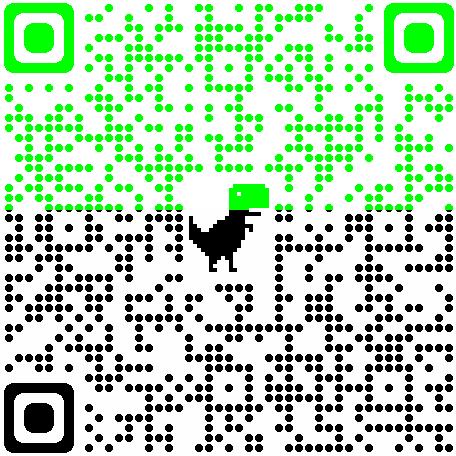
services
The Partnership for Prosperity, also known as P4P or The Partnership, emerged as an initiative recommended by the Winston-Salem Poverty Thought Force in February 2017. Tasked with coordinating the fight against poverty, raising public awareness, and advocating for local- and state-level policy change, P4P works to empower people living in low-resource neighborhoods by connecting them to local organizations that can reduce or eliminate barriers, and by maximizing opportunities to access resources to enhance lives. The 56 recommendations were made for policies that could reduce the poverty level in WinstonSalem. Uniquely, P4P employs an asset-based community development (ABCD) approach by creating spaces for residents to participate in the process of decision-making and problem-solving for the issues faced by their own community. These issues, termed the 5 Social Determinants of Health (5SDOH), are: Housing, Education, Jobs and Workforce Development, Food Insecurity and Health and Wellness.

Together, these conditions in the environment in which people are born, live, work, play, worship, and age affect a wide range of health, functioning and quality of life outcomes and risks.

PAGE 3 URBAN CALL — HEALTHY LIVING EVERY DAY!
Invited to Visit Our Website
for the latest information on community
You’re
PartnershipForProsperity.org
engagement, P4P activities, news, grants and announcements.
2021-2022 ANNUAL REPORT
In January 2021, the P4P Board of Directors approved a strategic direction that utilizes a collaborative place-based, bottom-up, resident-led approach to eliminating poverty in low-resource neighborhoods. This approach relies on collaborators including Place Matters, Neighbors for Better Neighborhoods (NBN), Power Up, Habitat for Humanity, the City, Financial Pathways, and others. These partnerships enable P4P to become embedded in neighborhoods and use assets that already exist to strengthen the physical, social, structural, and economic conditions and contribute to the well-being of the children, families, and individuals who live there. The goals for this placebased initiative include:

• GOAL 1: Promote collaboration among the institutional sectors already involved in placedbased efforts in the targeted neighborhood.
• GOAL 2: Use Study Circles to create an environment that allows neighborhood residents to make decisions and develop local solutions to poverty and inequalityproblems that help determine their futures.
• GOAL 3: Use Study Circles
Local Data
as a mechanism that allows for continuous feedback from residents to service providers that help create an understanding of where gaps exist, and innovation can occur.
• GOAL 4: Work with neighborhood leaders to ensure they are equipped with the necessary leadership skills to help them create the change they seek for their communities.
• GOAL 5: Work collaboratively with resident leaders and organizations to create or review neighborhood asset maps and connect them to community resources.

• GOAL 6: Help neighborhood leaders become aware of shared
measurement and performance monitoring systems.
• GOAL 7: Assist residents in determining strategic funding approaches for short-term residentled initiatives and longer-term funding for sustainable solutions and technical assistance around how to blend various funding sources.
P4P will address the barriers that make it difficult to meet residents’ needs and sustain thriving communitiess. There are five specific barriers that P4P seeks to address.
Housing & Homelessness

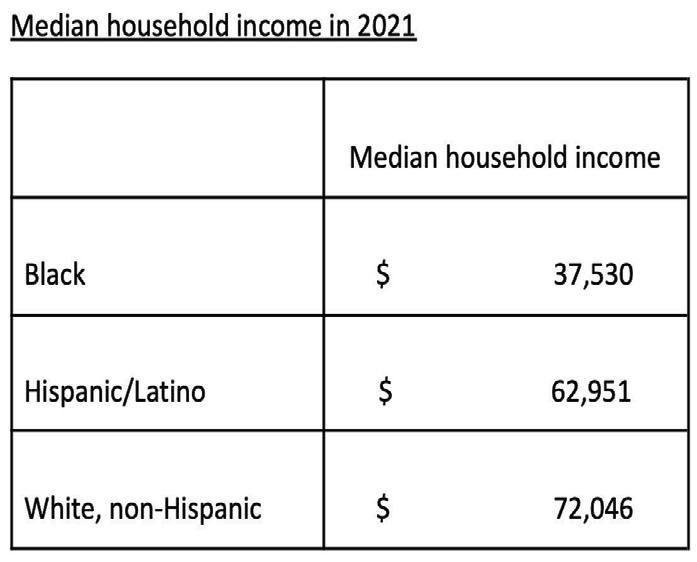
Health & Wellness Education Food Insecurity


Job & Workforce Development
Forsyth County Data


Forsyth County ranks among the worst counties in the United States for economic mobility, with over 17% of the population living in poverty compared to the national average of 13%. According to a Harvard study (Chetty and Hendren, 2018), children born to underprivileged families in the bottom income quantile in Forsyth County are overwhelmingly likely to remain stuck in poverty. The largest demographic living in poverty are females 25 - 34, followed by females 18 - 24 and then females 35 - 44 (Forsyth County, Data USA).
According to the U.S. Census Bureau data, of the 38.1 million people living in poverty, 56% were women. The COVID-19 pandemic has put individuals and families at an increased risk of falling into poverty in the U.S. as they face greater economic insecurity, due in large part to unprecedented unemployment that has disproportionately affected women (AmericanProgress.org)


Read more on page 7.
Unlike the traditional approach to community development, which is often top-down and problembased, P4P’s asset-based approach is a collaborative process between community members and professionals, allowing them to work together to determine outcomes that draw on residents’ strengths and assets. P4P seeks to create sustainable change without making biased assumptions about the agency of low-income, low-resource people to take control of their lives and prevent problems from determining their future.

PAGE 4 URBAN CALL — HEALTHY LIVING EVERY DAY! PAGE 5 URBAN CALL — HEALTHY LIVING EVERY DAY!
2021-2022 ANNUAL REPORT
P4P utilizes circle research to examine housing and jobs.
For a digital copy of Urban Call, visit Issuu com/SmsiUrbanCallMarketing.com.
56 Recommendations for Ending Poverty
The Poverty Thought Force believes that the people of Winston-Salem and Forsyth County possess a collective will to bring our community back to a place where poverty is not a barrier to anyone's prosperity. That's why it delivered its report with 56 specific recommendations grouped around five aspects of poverty: education and life skills, health and wellness, jobs and workforce development, housing and homelessness, and hunger and food insecurity.
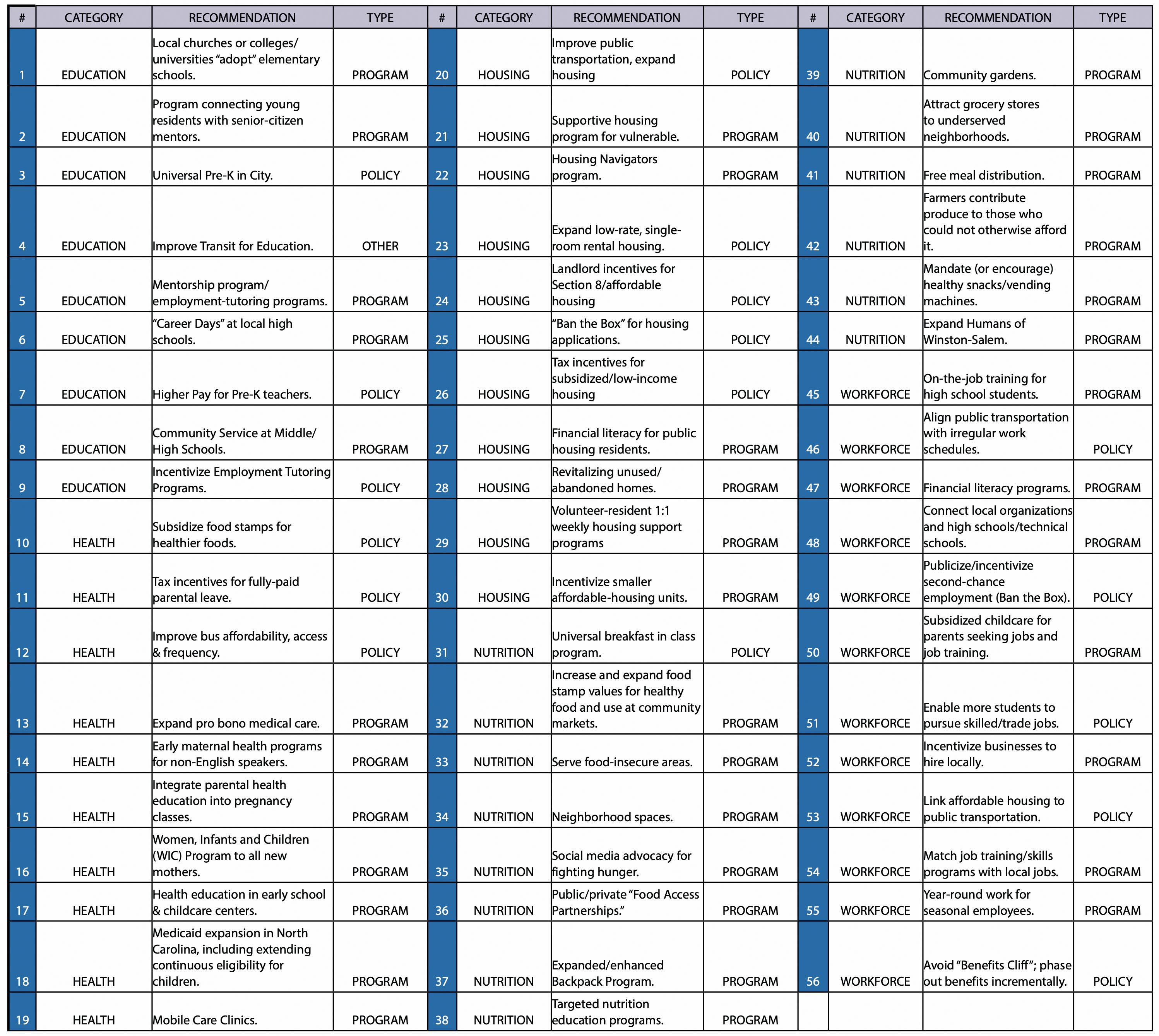
PAGE 6 URBAN CALL — HEALTHY LIVING EVERY DAY!
Changing her community one life at a time
By John Railey
Different Missions, Collective Vision
By Paula McCoy PARTNERSHIP4PROSPERITY

Kimberlee
McNeil
wakes up every morning thinking of how she might bring economic improvement to her East Winston neighborhood, Castle Heights. She knows all too well the challenges her fellow residents face. Her first job begins at 7 a.m. as a clerk at the Food Lion on New Walkertown Road, the only large grocery store in East Winston. She works her second job in the afternoon, that of a resident leader for the nonprofit Neighbors for Better Neighborhoods (NBN), listening closely to people, trying to help remove the barriers to upward economic mobility.
The sad truth has been that the only way to break the chain of generational poverty is to move out of East Winston. But McNeil, 58, who lives in her childhood home with her parents, grown children and grandchildren, won’t surrender. She is determined to stay in her neighborhood. And she is determined to make it better, equipped with what she has learned from NBN and an initiative that began
last year, the New Leadership Academy, which is supported by Winston-Salem State University’s Center for the Study of Economic Mobility. Alvin Atkinson, the center’s associate director and an NBN board member, said of McNeil: “Her passion and commitment for helping her family and neighbors improve the quality of their lives are clearly visible by all she has done.
McNeil was educated at Brunson Elementary School, East Forsyth High School, N.C. Central University and Gardner-Webb University, earning a degree in counseling and human services. She earned a master’s degree in education with an emphasis on family and community services through an online program from Ashford University in California. Then she worked as a restaurant manager and as the relationship development coordinator at the Quality
Education Academy. Career challenges led her to take the Food Lion job. She said she grew up middle class, but now lives in situational poverty.
In 2017, a friend who recognized McNeil’s commitment to social justice referred her to the NBN job, which is part-time. Then-Executive Director Paula McCoy nurtured McNeil’s talent for community outreach. “Kimberlee has grown as a leader and has a wealth of knowledge to contribute to the development of her neighborhood and to the greater community as a whole,” McCoy said.

Winston Salem Chronicle excerpt from John Railey (raileyjb@gmail. com), writer-in-residence for The Center for the Study of Economic Mobility (CSEM) at Winston Salem State University, www.wssu.edu/ csem.
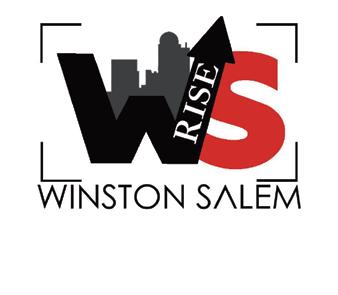
P4P’s mission, “to engage people with lived experiences in creating solutions that reduce poverty by eliminating silos, aligning resources and advocating for policies through a racial and ethnic equity lens” is place based, bottom-up and resident-led. We serve as a support to neighborhoods as they solve their own problems and develop solutions to placebased poverty, resulting in a plan for their neighborhood that they implement. WSRISE’s mission is to develop and partner with community led initiatives that eradicate all racial disparities for Black people. RISE’s vision of “a just community that provides full access and opportunities for all,” is a vision that most Black-led organizations can share and work toward.
Study circles look at housing, jobs
Study Circles create an environment that allow neighborhood residents to make decisions and develop local solutions to poverty and inequality - problems that help determine their futures.
INTENDED OUTCOME: Residents are decision makers and problem solvers around issues that impact their quality of life and have developed a neighborhood action plan.
ACCOMPLISHMENT: Special emphasis is being placed on recruiting parents or grandparents with children 0-8. Approximately 15 individuals participated face-to-face in the Housing Study Circle. The survey identified over 70% of residents as homeowners with the average income as $44,000. Residents shared experiences and identified solutions to
concerns around housing repairs, aligning housing resources and 2021-2022 Annual Report 11 homeownership programs for residents that rent. A thorough community action plan was developed. Participants did not want the study circle to end and most agreed to join the housing plan implementation committee.
The Jobs/Workforce study circle recruited ten people with eight residents completing the study circle. Residents identified employment barriers for their most vulnerable populations as their top priority. Recruitment is underway for the other study circles. A plan will be developed for each neighborhood; residents will be equipped to implement and sustain the neighborhood.
Study Circles are a mechanism that
allow for continuous feedback from residents to service providers that help create an understanding of where gaps exist, and innovation can occur.
Intended Outcome: Service providers have learned from residents about gaps in service delivery and where innovations can occur and have adapted, expanded, or made innovations to their service delivery. Discussions are underway with the City Housing Department to conduct an external housing condition assessment. The Study Circle on Housing and the Jobs and Workforce circles are complete. The Steering Committee met with Marla Newman to discuss conducting the housing conditions assessment in Castle Heights with the possibility of expanding the assessment to include the
Place Matters footprint. The Study Circle for Housing ran for five weeks. The study circle facilitator is a resident of the neighborhood and will facilitate the other study circles. Service providers invited had an opportunity to hear from residents to learn about their problems and their solutions and if changes are needed in their service delivery. Housing conditions are a serious concern for participants. Five housing service providers and four jobs/workforce service providers better understand the needs of the residents. Service providers have begun several collaborations with communities to improve service delivery. Delivery times have greatly improved and residents now have a point of contact when service is needed.
PAGE 7 URBAN CALL — HEALTHY LIVING EVERY DAY!
Kimberlee McNeil
partnershipforprosperityws.org WSRise.org
“She is determined to stay in her neighborhood, and she is determined to make it better.”
Richburg leads United Way

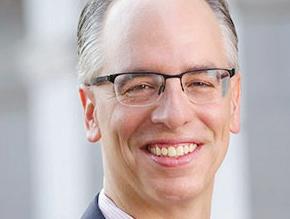

Dr. Antonia Monk Richburg, President, and CEO of the United Way of Forsyth County, has more than 30 years of experience in nonprofit management, including project management, grant management, community building, and strategic communications. She has a Ph.D. in Leadership Studies from N.C. A&T State University, and a master’s degree in public affairs with a concentration in nonprofit management and public personnel from the University of North Carolina at Greensboro. She also has a postgraduate Advanced Certificate in Nonprofit Leadership from Duke University. In addition, Dr. Richburg attended seminary and is a licensed minister.


At the United Way of Forsyth County, Antonia leads staff, volunteers, and partners in strong community collaborations to address regional problems that no one

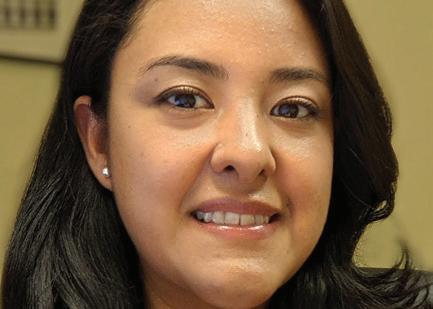
United Way of Forsyth County (UWFC) is the fiscal sponsor of The Partnership for Prosperity (P4P).
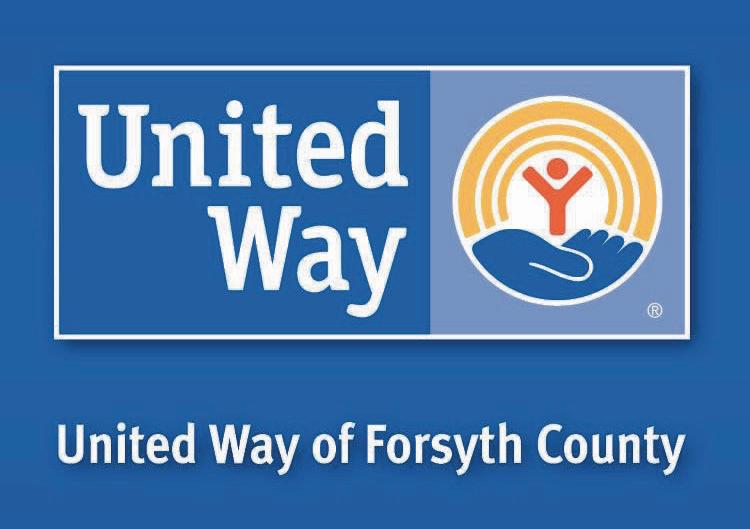
P4P operates under and utilizes UWFC’s 501(c)(3) status so that their existing projects can fulfill its charitable mission. UWFC has sponsored P4P since inception in 2017.
organization can address alone.
Antonia brings to this work a longstanding passion for supporting underserved communities, a commitment to equity, and the
courage to be a visionary in pursuing a more just and equitable community. Prior to joining the United Way, Dr. Richburg was the Vice President and Senior Program Officer for the Cone Health Foundation for 23 years, where she oversaw grant-making efforts addressing access to care, mental health, and substance abuse while leading the Foundation’s work in diversity, equity, and inclusion. She also has a long-standing history with the United Way, formerly serving as the Senior Community Collaborations and Initiatives Specialist/Bridges to Success Co-Project Director at United Way of Greater Greensboro for five years. She has also worked as a Project Manager for the Robert Wood Johnson Foundation’s Partners in Caregiving, as a Magnet School Recruitment Coordinator for the former Greensboro City Schools, and as a Community Relations Director at the Greensboro Housing Authority.
Ramos P4P board chairman
Santiago Ramos is a dedicated community organizer, entrepreneur, and business consultant, driven by his own experiences as an immigrant from Colombia.

As the board chair at Partnership 4 Prosperity, Santiago focuses on driving innovative solutions and shaping policies to promote equitable
Leaders strengthen community
Meet the P4P Governing Board
living.
Previously, he served as a community organizer at Neighbors for Better Neighborhoods, connecting community members to resources and opportunities.

Santiago’s long-term vision includes building strategic partnerships and developing a board that embraces
McCoy P4P director
Paula has spent a large part of her career as a personal and professional trainer, program and community developer. She has over 30 years of experience training groups, developing programs, engaging community and leading five local and state nonprofit organizations. Locally, Paula is most recently known for her work in Assetbased Community Development. She is an energetic, motivated and committed individual dedicated to helping communities, organizations and individuals realize their potential for success. She considers this as her “life work.” As a native of Winston-Salem, Paula attended the public schools and graduated from Carver High School. She received her undergraduate and postgraduate degrees from North Carolina A&T
State University earning a Bachelor of Arts Degree in English Education and a Master of Arts degree in Education Administration and Supervision. Paula earned a second Masters degree in Social Work (MSW) with a concentration in community development at Case Western Reserve University in Cleveland, Ohio on May 15, 2005. Paula is also a certified life coach through the International Coaches Federation (ICF) focusing on community and organizational development. Since December 2019, Paula has directed the Partnership for Prosperity (P4P), an initiative recommended by the Winston-Salem Poverty Thought Force in 2017 that’s tasked with coordinating the fight against poverty.
innovative approaches to address poverty-related issues.
Drawing from his experience in community and asset building, Santiago is committed to fostering relationships that empower communities to overcome obstacles and achieve prosperity.
Patterson P4P associate
Arleatha Patterson is a native of Winston Salem and a passionate community engagement associate (CEA). She has worked with communities and institutions across the county to bridge the gap between services and people, serving as a Program Coordinator for Neighbors for Better Neighborhoods leading initiatives as Timebanking, training residents and others in Asset Based Community Development.
She coordinated The Age Friendly initiative through Forsyth Futures. She currently works in communities throughout the city in poverty alleviation and community development.

PAGE 8 URBAN CALL — HEALTHY LIVING EVERY DAY!
Mayor Allen Joines City of Winston-Salem Derwin Montgomery Government Relations Director, American Cancer Society
Debbie Wilson Chief Impact Officer, United Way of Forsyth County
Rogan Kersh, Wake Forest University Distinguished Professor
Dr. Antonia Monk Richburg President & CEO, United Way of Forsyth County
Vivian Perez Chandler Executive Director, Asset Building Coalition of Forsyth County
Paula McCoy Director, Partnership for Prosperity
Art Gibel Retired President and CEO, Goodwill Industries of Northwest N.C.
Arleatha Patterson Partnership for Prosperity
Not Pictured: Kimberlee McNeil, Community Ambassador; Cynthia Rucker, Urban League; Kaisha McDermott-Carter, Goodwill Industries
Santiago Ramos P4P Board Chairman Navigator Lead, Hustle


 By Paula McCoy PARTNERSHIP4PROSPERITY
By Paula McCoy PARTNERSHIP4PROSPERITY





 & CEO
& CEO
































